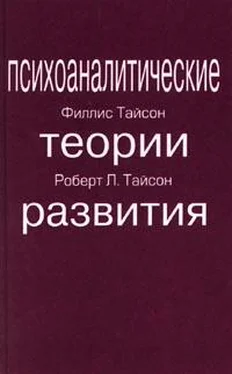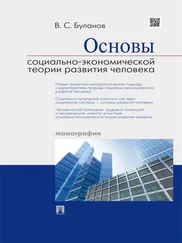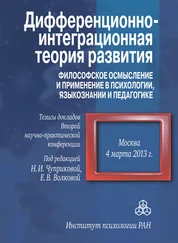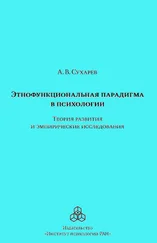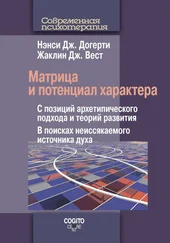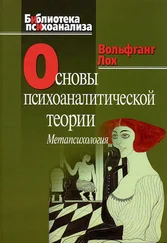Роберт Тайсон - ПСИХОАНАЛИТИЧЕСКИЕ ТЕОРИИ РАЗВИТИЯ
Здесь есть возможность читать онлайн «Роберт Тайсон - ПСИХОАНАЛИТИЧЕСКИЕ ТЕОРИИ РАЗВИТИЯ» — ознакомительный отрывок электронной книги совершенно бесплатно, а после прочтения отрывка купить полную версию. В некоторых случаях можно слушать аудио, скачать через торрент в формате fb2 и присутствует краткое содержание. Город: М., Год выпуска: 1998, ISBN: 1998, Издательство: Деловая книга, Жанр: Психология, на русском языке. Описание произведения, (предисловие) а так же отзывы посетителей доступны на портале библиотеки ЛибКат.
- Название:ПСИХОАНАЛИТИЧЕСКИЕ ТЕОРИИ РАЗВИТИЯ
- Автор:
- Издательство:Деловая книга
- Жанр:
- Год:1998
- Город:М.
- ISBN:5-88687-019-9
- Рейтинг книги:5 / 5. Голосов: 1
-
Избранное:Добавить в избранное
- Отзывы:
-
Ваша оценка:
- 100
- 1
- 2
- 3
- 4
- 5
ПСИХОАНАЛИТИЧЕСКИЕ ТЕОРИИ РАЗВИТИЯ: краткое содержание, описание и аннотация
Предлагаем к чтению аннотацию, описание, краткое содержание или предисловие (зависит от того, что написал сам автор книги «ПСИХОАНАЛИТИЧЕСКИЕ ТЕОРИИ РАЗВИТИЯ»). Если вы не нашли необходимую информацию о книге — напишите в комментариях, мы постараемся отыскать её.
ПСИХОАНАЛИТИЧЕСКИЕ ТЕОРИИ РАЗВИТИЯ — читать онлайн ознакомительный отрывок
Ниже представлен текст книги, разбитый по страницам. Система сохранения места последней прочитанной страницы, позволяет с удобством читать онлайн бесплатно книгу «ПСИХОАНАЛИТИЧЕСКИЕ ТЕОРИИ РАЗВИТИЯ», без необходимости каждый раз заново искать на чём Вы остановились. Поставьте закладку, и сможете в любой момент перейти на страницу, на которой закончили чтение.
Интервал:
Закладка:
Sterba, R. F. (1942). Introduction. Psychoanalytic theory of the libido, 3rd ed. New York: Brunner/Mazel, 1968.
Stern, D. N. (1974a). Mother and infant at play: The dyadic interaction involving facial, vocal, and gaze behaviors. In The effect of the infant on its careglver. ed. M. Lewis and L. Rosenblum. New York: Wiley, pp. 187-213.
Stern, D. N. (1974b). The goal and structure of mother-infant play. J. Amer. Acad. Child Psychlat., 13:402-421.
Stern, D. N. (1977). The first relationship: Mother and infant. Cambridge: Harvard Univ. Press. Stern, D. N. (1984). Affect attunement, in Frontiers of infant psychiatry. Vol. 2, ed. J. D. Call, E. Galenson, and R. L. Tyson. New York: Basic Books, pp. 74-85.
Stern, D. N. (1985). The interpersonal world of the infant. New York: Basic Books.
Stern, D. N.; Barnett, R. K.; and Spieker, S. (1983). Early transmission of affect: Some research issues. In Frontiers of infant psychiatry, ed. J. D. Call, E. Galenson, and R. L. Tyson. New York: Basic Books, pp. 74-85.
Stoller, R. J. (1968a). Sex and gender: On the development of masculinity and femininity. New York: Science House.
Stoller, R. J. (1968b). The sense of femaleness. Psychoanal. Q., 37-42-55.
Stoller, R. J. (1976). Primary femininitv.y. Amer. Psychoanal. Assn., 24 (Suppi.): 59-78.
Stoller, R. J. (1979). Fathers of transsexual children. J. Amer. Psychoanal. Assn., 27:837-866.
Stoller, R.J. (1985). Presentations of gender. New Haven: Yale Univ. Press.
Stolorow, R. D., and Lachmann, F. M. (1978). The developmental prestagcs of defenses: Diagnostic and therapeutic implications. Psychoanal. ()., 47:73-102.
Strachey, J. (1961). Editor's introduction. In S.E., 19:3-11.
Sutherland, J. D. (1980). The British object relations theorists: Balint, Winnicott, Fairbairn, Guntrip.y. Amer. Psychoanal. Assn., 28:829-860.
Tennes, K., and Lampi, E. (1964). Stranger and separation anxiety in infancy. J. Nerv. Merit. Dis., 139:247-254.
Ticho, E. A. (1982). The alternate schools and the self. J. Amer. Psychoanal. Assn., 30:849-862.
Ticho, G. (1976). Female autonomy and young adult women. Amer. Psycho-anal. Assn., 24:139-156.
Tolpin, M. (1971). On the beginnings of a cohesive self: An application of the concept of transmuting internalization to the study of the transitional object and signal anxiety. Psychoanal. Study Child, 26:316-352.
Tolpin, M. (1978). Self-objects and oedipal objects. Psychoanal. Study Child, 33:167-184.
Tornkins, S. S. (1962). The positive affects. Vol. 1 of Affect, imagery, consciousness. New York: Springer.
Tornkins, S. S. (1963). The negative affects. Vol. 2 of Affect, imagery, consciousness. New York: Springer.
Tornkins, S. S. (1970). Affect as the primary motivational system. In Feelings and emotions: The Loyola Symposium, ed. M. B. Arnold. New York: Academic Press, pp. 101 — 110.
Tornkins, S. S. (1978). Script theory: Differential magnification of affects. In Nebraska Symposium on Motivation. Vol. 26, ed. E. H. Howe, Jr., and R. A. Diestbier. Lincoln: Univ. of Nebraska Press, pp. 201-236.
Tornkins, S. S. (1981). The quest for primary motives: Biography and autobiography of an idea. Personal. Soc. Psychol., 41:306-329.
Tronick, E.; Als, H.; Adamson, L.; Wise, S.; and Brazelton, Т. В. (1978). The infant's response to entrapment between contradictory messages in face—to—face interaction. J. Amer. Acad. Child Psychiat., 17:1-13.
Tronick, E.; Als, H.; and Brazelton, Т. В. (1977). The infant's capacity to regulate mutuality in face-to-face interaction. J. Communication, 27:74-80.
Tronick, E. Z., and Gianino, A. (1986). Interactive mismatch and repair. Zero to Three, 6:1-6.
Tyson, P. (1978). Transference and developmental issues in the analysis of a prelatency child. Psychoanal. Study Child, 33:213-236.
Tyson. P. (1980). The gender of the analyst: In relation to transference and countertransference manifestations in prelatency children. Psychoanal., 35:321-338.
Tyson, P. (1982a). A developmental line of gender identity, gender role and choice of love object. Amer. Psychoanal. Assn., 30:59-84.
Tyson, P. (1982b). The role of the father in gender identity, urethral eroticism, and phallic narcissism. In On fathers: Observations and reflections, ed. S. Cath, A. Glirwitt, and J. Ross. Boston: Little, Brown, pp. 175-187.
Tyson, P. (1986a). Female psychological development. Ann. Psychoanal., 14:357-373.
Tyson, P. (1986b). Male gender identity: Early developmental roots. Psychoanal. Rev., 73:405-425.
Tyson, P. (1988). Psychic structure formation: The complementary roles of affects, drives, object relations, and conflict. J. Amer. Psychoanal. Assn., 36 (Suppl.):73-98.
Tyson, P. (1989a). Two approaches to infant research: A review and integration. In The significance of infant observational research for clinical work with children, adolescents and adults, ed. S. Dowling and A. Rothstein. Madison, Conn.: Int. Univ. Press, pp. 3-21.
Tyson, P. (1989b). Infantile sexuality, gender identity, and obstacles to oedipal progression. J. Amer. Psychoanal. Assn., 37:1051-1069.
Tyson, P. (in press). The adolescent process and adult treatment. The significance of child and adolescent analysis for clinical work with adults, ed. S. Dowling and A. Rothstein. New York: Int. Univ. Press.
Tyson, P., and Tyson, R. L. (1984). Narcissism and superego development. J. Amer. Psychoanal. Assn., 32:75-98.
Tyson, R. L. (1983). Some narcissistic consequences of object loss: A developmental view. Psychoanal. Q., 52:205-224.
Tyson, R. L. (1986). The roots of psychopathology and our theories of development. Amer. Acad. Child Psychot., 25:12-22.
Tyson, R. L. (1989). Psychological conflict in childhood: Adevelopmental view. Paper presented at the Seminar for Clinicians, American Psychoanalytic Association, New York.
Tyson, R. L. (in preparation). The psychoanalysts of the relatency child.
Van Leeuwen, K. (1966). Pregnancy envy in the male. Int. J. Psychoanal., 47:319-324.
Vigotsky, L. S. (1934). Thought and language. New York: MIT Press, 1962.
Waclder, R. (1930). The principle of multiple function: Observations on overdetermination. In Psychoanalysis: Observation, theory, application, ed. S. A. Guttman. New York: Int. Univ. Press, 1976, pp. 68-83.
Waelder, R. (1932). The psychoanalytic theory of play. In Psychoanalysts: Observation, theory, application, ed. S. A, Guttman. New York: Int. Univ. Press, 1976, pp. 84-100.
Waelder, R. (1936). The problems of the genesis of psychic conflict in earlier infancy. In Psychoanalysis: Observation, theory, application, ed. S. A. Guttman. New York: Int. Univ. Press, 1976, pp. 121-188.
Walleretein, J. S., and Kelly, J. B. (1980). Sunning the breakup. New York: Basic Books.
Wallerstein, J. S., and Blakeslee, S. (1989). Second chances. New York: Ticknor and Fields.
Wallerstein, R. S. (1981). The bipolarself: Discussion of alternate perspectives. J. Amer. Pfychoanal. Assn., 29:377-394.
Wallerstein, R. S. (1983). Defenses, defense mechanisms, and the structure of the mind. J. Amer. Psychoanal. Assn., 31:201-225.
Wallerstein, R. S. (1988). One psychoanalysis or many? Int. J. Psychoanal., 69:5-22.
Weil, A. P. (1970). The basic core. Psychoanal. Study Child, 25:442-460.
Weil, A. P. (1976). The first year: Metapsychological inferences of infant observation. In The process of child development, ed. P. Neubauer. New York: Aronson, pp. 246-265.
Weil, A. P. (1978). Maturational variations and genetic — dynamic issues. J. Amer. Psychoanal. Assn., 26:461-491.
Weinshel, E. M. (1970). Some psychoanalytic considerations on moods. Int.J. Psychoanal., 51:313-320.
Weissman, P. (1954). Ego and superego in obsessional character and neurosis. Psychoanal. Q., 23:529-543.
Читать дальшеИнтервал:
Закладка:
Похожие книги на «ПСИХОАНАЛИТИЧЕСКИЕ ТЕОРИИ РАЗВИТИЯ»
Представляем Вашему вниманию похожие книги на «ПСИХОАНАЛИТИЧЕСКИЕ ТЕОРИИ РАЗВИТИЯ» списком для выбора. Мы отобрали схожую по названию и смыслу литературу в надежде предоставить читателям больше вариантов отыскать новые, интересные, ещё непрочитанные произведения.
Обсуждение, отзывы о книге «ПСИХОАНАЛИТИЧЕСКИЕ ТЕОРИИ РАЗВИТИЯ» и просто собственные мнения читателей. Оставьте ваши комментарии, напишите, что Вы думаете о произведении, его смысле или главных героях. Укажите что конкретно понравилось, а что нет, и почему Вы так считаете.
